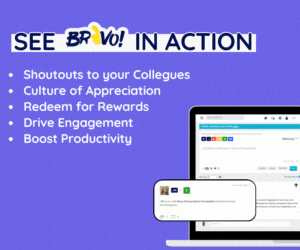
Organizations use a reward system for employees to appreciate their worthwhile hard work and contributions.
Nevertheless, the rationale behind the rewards is to make the hardworking employees continue their good work.
Companies also implement such a system to make unfocused and unproductive employees efficient and perform better.
Relevant research reveals that the main reason behind employee motivation is the lack of recognition for their work. It also shows that companies with employee rewards have 13% more employee engagement than those with no such system.
Stats and studies affirm that reward and recognition systems can make employees do wonders for a company. Yet, there are some misunderstandings surrounding it.
Moreover, this article is more of a myth buster that will tell you how the disadvantages of the reward system are really not the disadvantages and what’s the truth behind the impact of employee recognition and rewards.
Below, we bring to light the reality of the false beliefs associated with employee rewards, along with discussing the advantages that they actually bring to any organization.
Disadvantages of reward system for employees: The hoax

It results in additional expenses (but it actually does not!)
Rewards for employees may cause a company extra costs. However, it is mostly when a company considers the effectiveness of a system limited to monetary rewards only, which is, however, not the case, especially with younger employees.
A common misconception in terms of employee rewards is that they should be some out-of-the-world expensive gifts. Also, a common notion is that rewards do their job when they include some kind of financial value. While monetary-based gifts are indeed valued by the employees, overemphasizing them and considering them the only option in a reward and recognition system is entirely wrong.
Making use of non-monetary rewards is more impactful since an employee can be recognized immediately for notable work. On the contrary, a monetary reward, such as a bonus, usually requires some time, which takes away the essence of an efficient recognition: an in-time appreciation.
Non-monetary rewards are cost-efficient as they involve no or little expense. Thus, the notion of an employee reward bringing additional costs for a company is, in most cases, a misunderstanding and, in some cases, a hoax.
In conclusion, as opposed to a common misconception, rewards do not result in additional costs. However, suppose a company overstressed expensive gifts and high-monetary rewards without understanding that their non-monetary counterparts are equally effective, if not more. In that case, it may result in additional expenses.
Advantages of reward system for employees: The reality

It motivates the employees
The first and foremost advantage of rewarding your employees is that it helps to motivate the workforce. It encourages the employees to take out the most of their potential in their work.
Rewards may hold no significance to those employees, at, who are not willing to work with motivation and dedication whatsoever. However, rewards may act as a catalyst for those who have the skills and focus but require a little drive to work to their full potential.
Rewards can also help to bring the most out of your average-joe employees. When you start associating rewards with achievements, every employee starts to put in more effort, irrespective of their capability. As a result, the underachieving employees also come out as top performers.
It gives job satisfaction
When employees get rewards for their achievements, they consider their respective careers to be on the right path.
With a reward system in place, the employees are likely to believe that their careers are heading in the right direction, leading them to have job satisfaction. And with the employees satisfied with their jobs, they tend to stay and work longer for their companies.
In addition, it leads the employees to believe that their careers are in their control, besides being on the right path. It furthers their happiness and satisfaction from their jobs, making them perform better and be more productive.
It fosters workplace competition

One of the advantages of rewards for employees is that it results in healthy workplace competition.
When employees witness their peers receiving rewards and recognition due to an accomplishment, they naturally desire to earn the same. So, the workplace becomes competitive with each workforce employee working hard to gain credit and limelight for achievement.
The competitive work culture results in the elevation of the performance levels of the employees, making the company the absolute winner of this competitiveness.
It clearly defines the desired goals/behaviors
A system involves rewarding the employees for particular or desired behaviors or organizational goals.
With the employees understanding what would lead them to earn rewards, it becomes easier to acquire one. Also, the goals that the organization wants to achieve also become apparent. Thus, with a criterion set through a system, the long-run goals of the company also become understandably clear.
Read: A Few Ways Of Reward System For Employees
A Reward System for Employees: To use or not?
Clearly, a reward system for employees is indeed advantageous. Its only disadvantage of reward management remains in a false notion that rewards are expenses and thus bring extra costs with them, which is, of course, not true as discussed in the article. So, the takeaway is that you should use a system that helps in rewarding employees.
Relevantly, Bravo enables an organization to practice a system that is both productive and cost-efficient. It comes with an array of non-monetary rewards using which your company can bring motivation to the workplace and can also help you perform an in-time employee recognition. You can book a free demo here to learn more about it.
Frequently asked questions
You can create a reward system by rewarding behaviors and teams, involving the employees, being specific and consistent, and aligning rewards with your professional goals.
A reward system that is inclusive, unbiased, specific, and timely is more effective than the one which is not.
A reward system makes the employees work with more dedication and focus. Therefore, it motivates the employees to put more effort into their respective work.
A fair reward system for employees should provide equal opportunities for the entire workforce. Furthermore, it should be impartial, so no employee feels alienated.
The main types of reward systems are monetary, non-monetary, employee assistance, and employee recognition.







